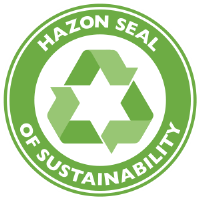Jewish learning Admat Kodesh Takes Meaningful Action

יעלז שדי וכל-אשר-בו אז ירננו כל-עצי-יער
“The fields and everything in them exult, then shall all the trees of the forest shout for joy!” (Ps 96:12)
The month of Shevat is an opportunity to take stock of our relationship to the environment as individuals and as a community. As we celebrate Tu B’Shevat, we are in a moment of “The Great Turning.” This is both our individual teshuvah (returning) to our planetary connection as well as what Joanna Macy identifies “as the transition from a doomed economy of industrial growth to a life-sustaining society committed to the recovery of the world.”
At Hebrew College, we are taking meaningful action. For the past year, Admat Kodesh, our environmental sustainability committee, has been meeting regularly to think about what should be happening in our Hebrew College building and community, to help us to take action in the communities where we live, and to prepare us to lead in the communities where we will serve. We are focusing our attention on our relationship with the natural world, on raising our collective awareness, on coming up with solutions, and on organizing for action.

On Tu B’Shevat 2020, our group launched an eight-week educational program designed to increase our environmental literacy and capacity to implement personal changes. We planned lunchtime conversations, text studies, and other opportunities for engagement, many of which, unfortunately, were cancelled or moved online due to COVID.
At part of these efforts, we also launched a survey to identify current personal practices in sustainable food choices, waste management, transportation, and environmental justice, advocacy, and activism. A total of 60 students, staff, and faculty members completed the survey, which gleaned the following. Here is a sampling of the findings:
- 48 percent of respondents can articulate in a sentence or two how their food choices impact the environment.
- 50 percent of respondents eat meat once per week or less, and 24 percent of respondents never eat meat.
- 68 percent of respondents compost at home with some regularity.
- 90 percent of respondents travel to Hebrew College by car (pre-pandemic).
- 25 percent of respondents always purchase cleaning, household and body care products made of non-toxic ingredients.
- In the 12 months prior to the survey’s completion, approximately 25% of respondents had attended a climate action strike and had contacted a local representative about environmental concerns.
A year has gone by since the survey, but as the Biden presidency approaches with visible climate change advocates across the government’s leadership, the planetary stakes remain high, and the momentum continues to swell both in sea levels and in people rising up for environmental justice. These survey results provide a snapshot of our current habits and show us where we can improve our efforts to build a more sustainable future. As we begin Shevat, it is again an opportunity to take stock of our relationship to the environment as individuals and as a community and to refocus our efforts on environmental justice.
Hebrew College has unique work to do both in its curriculum and in its ever evolving sustainable norms. How will we walk this walk? How will we harness the power of our religious imagination and lift up the Torah through our lips and our hands with an authentic embrace of our created world? We encourage you to learn more about Admat Kodesh’s work to build awareness and capacity for the resiliency needed to navigate the uncharted climate chaos of our times. And if you are a Hebrew College student, faculty member, or staff member, join us!
Admat Kodesh meets the first Wednesday of every month at 7 p.m. Please contact Lorin Troderman for more information.

